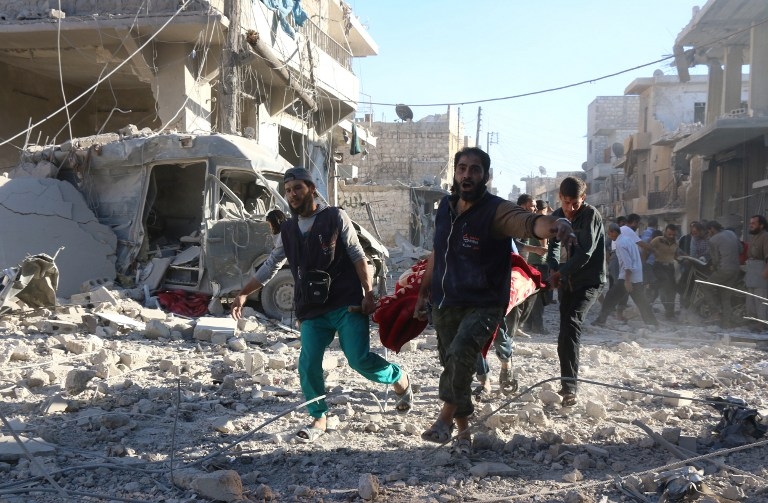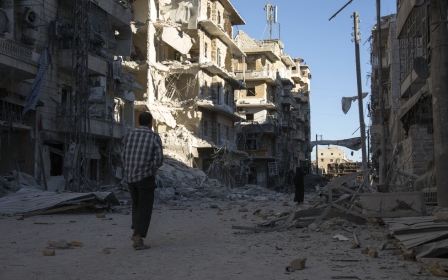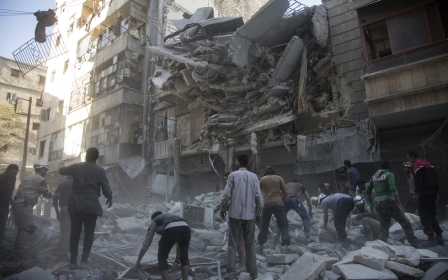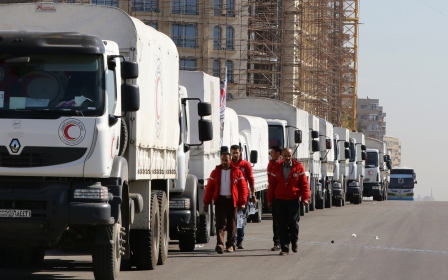Biggest hospital in rebel-held Aleppo out of action after barrel bombing: Reports

The biggest hospital in rebel-held Aleppo was hit by barrel bombs on Saturday morning, activists reported, as Russian-backed Syrian forces pressed an advance on the partly besieged city and the US stuck with diplomacy.
The M10, or Sakhour clinic, the largest medical facility still operating in the besieged rebel-held east of the city, was pounded by four barrel bombs and a so-called “bunker-buster” bomb on Saturday morning, the opposition SMART news agency reported. The bombing knocked the hospital out of service, the agency said.
SAMS radiologist and hospital administrator Mohammad Abu Rajab made an urgent call for help on Saturday morning from inside M10. "The hospital is being destroyed! SOS, everyone!" he said in an audio message distributed to journalists. An American relief organization said two patients were killed and 13 injured in the attack, Reuters reported.
The UN has warned that a humanitarian catastrophe is unfolding in Aleppo unlike any witnessed so far in Syria's brutal five-year war, which has claimed more than 300,000 lives.
The fighting came as the World Health Organisation said 338 civilians, including 106 children, had been killed and 846 wounded in the past few weeks in the city, which has suffered intense bombardment by the Syrian and Russian air forces since the collapse of a ceasefire.
Air strikes on Saturday morning also cut off water supplies from the whole city, the local rebel coordination office told Sky News Arabia.
Bunker-buster bombs, known in Arabic as “earthquake bombs,” are designed to penetrate targets buried deep underground.
The hospitals attack was confirmed by Adham Sahloul of the Syrian American Medical Society (SAMS), which supports medical facilities inside Aleppo.
Sahloul said a small group of patients and doctors "were inside the hospital for basic triage, bandaging, and cleaning services for emergency cases" when the bombardment began and remain trapped there.
Both M10 and the second-largest hospital in the area, M2, were previously hit by heavy bombardment on Wednesday in strikes that UN Secretary-General Ban Ki-moon denounced as "war crimes".
A separate strike on Saturday morning destroyed a historic Armenian church in the Bustan al-Bashr distrct of east Aleppo.
The French foreign minister on Saturday condemned what he called the "systematic targeting" of health workers, calling for an immediate cessation of hostilities in the city.
"In the flood of violence that has overwhelmed Aleppo for several days, the systematic targeting of structures and health workers is particularly unjustifiable," Jean-Marc Ayrault said.
"This new attack only confirms the absolute urgency of a cessation of hostilities in Aleppo and access for civilian populations to the humanitarian assistance they desperately need," he said.
The foreign ministers of the US and Russia, which brokered a week-long truce deal that collapsed last month, spoke by phone on Saturday.
The foreign ministry in Moscow said on Facebook that Sergei Lavrov spoke to his American counterpart John Kerry and they "examined the situation in Syria, including the possibility of normalising the situation around Aleppo".
It said "illegal armed groups" continue fighting in the city despite Russian-US agreements.
The city, once the second-largest in Syria, was rocked by artillery exchanges throughout the night and into Saturday morning as government forces pressed a two-pronged assault on rebel-held districts in the east.
There have been mounting civilian casualties on both sides of the divided city, with local news sites reporting that at least 31 people were killed in the 24 hours to Saturday morning.
About 250,000 residents are living under a government siege in the rebel-held east, and around 1.2 million face daily rocket fire by the rebels on the government-held west.
Medical charity Doctors Without Borders has described the impact of Syrian and Russian bombardment of the east as a "bloodbath".
In the north of the city, meanwhile, residents of government-held areas said they were relieved that the rebels were being pushed back, but feared retaliation.
"We were happy when we heard about the army's advance," said Majed Abboud, a 32-year-old car dealer.
"But I'm afraid that with these ferocious clashes, there will be some kind of reaction from the armed groups," he said.
On both sides, at least 220 people have been killed since 22 September, when the government began a ground offensive backed up by Russian and Syrian air strikes, according to the British-based Syrian Observatory for Human Rights.
The offensive, which may become the most decisive of the years-long conflict, has seen the army win back territory in the north of Aleppo that it had not held since 2013.
Troops have also pushed back the front line in the city centre, one which had remained largely static since the rebels seized eastern districts in 2012.
The civilian death toll has triggered mounting outrage against both the Syrian government and its Russian ally.
British Foreign Secretary Boris Johnson told Saturday's Sun newspaper that Moscow risked becoming an international pariah by continuing to back the offensive.
New MEE newsletter: Jerusalem Dispatch
Sign up to get the latest insights and analysis on Israel-Palestine, alongside Turkey Unpacked and other MEE newsletters
Middle East Eye delivers independent and unrivalled coverage and analysis of the Middle East, North Africa and beyond. To learn more about republishing this content and the associated fees, please fill out this form. More about MEE can be found here.




